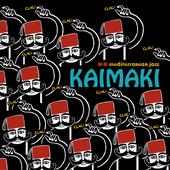Kaïmaki was borne out of Tsapis’ greek roots, and of the musical folklore of this country. In 2007, one year after its creation, its members are invited
to take part in the “Jazz à Porquerolles†festival, where they play with singer André Minvielle. That same year, Kaïmaki wins the audience award of the Jazz à venir festival. Inspired by the graphics of Lebanese cartoonist Zeina Abirached, Tsapis also develops an original concept of a musical spectacle, illustrated through an overhead projection of the artist’s pieces.
Each of the members of Kaïmaki brings with him a particular musical colour, drawn from his specific culture and origins; but all are united in the desire, fundamental to the philosophy of jazz music, to reclaim a folkloric repertoire.
Stéphane Tsapis, pianist, composer and arranger for the band, is strongly influenced by rebetiko, and the music from the shallows of the Pirée.
Mehdi Chaib, a brilliant saxophonist and percussionist of Moroccan origin, brings with him his experience and knowledge of the gnawa music.
Yann Pittard, a talented multi-instrumentist, studied oud with the masters Hazem Shaheen and Abdu Dagher. An eclectic musician, he navigates as easily and with the same pleasure through free jazz and Bengali music.
Arthur Decloedt, a Brasilian double-bass player recently arrived in France, carries over the soft swing that is characteristic of Brasilian music.
Johan Guidou, a remarkable drummer from the modern jazz Parisian scene, contributes his rock culture and his particular taste for improvisation and odd rhythms to the band. His wide range of sonorities also makes him an ideal member.
Kaïmaki is not about folkloric music, it does not identify with that particular sound; but its music is infused by it, by this folkloric source that is a condition for its own existence. This dialogue between the universal language which makes up “art†music, and the intrinsically personal and intimate form of expression that is folkloric music, is at the heart of jazz music; without it, it would wither away.
Kaïmaki et Zeina Abirached au Goethe institut
